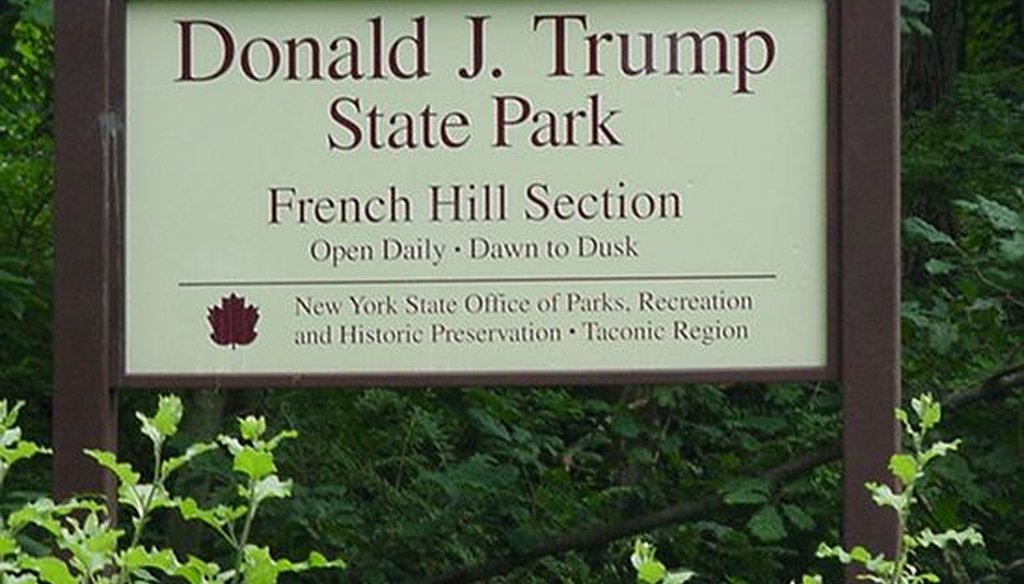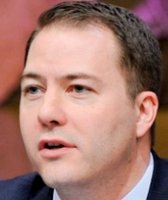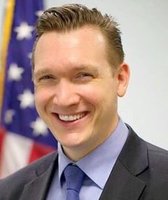Stand up for the facts!
Our only agenda is to publish the truth so you can be an informed participant in democracy.
We need your help.
I would like to contribute

A sign at the entrance to Donald J. Trump State Park in New York in 2008 (Alan Kroeger, Wikimedia Commons)
If Your Time is short
• Some New York state legislators are urging officials to rename Donald J. Trump State Park, whose legacy as president is controversial in his home state.
• When Trump donated the land for the park in 2006, his lawyers sent the Parks Department a letter with instructions on naming it after him. Whether this constitutes a binding agreement is now in dispute.
Even after officially decamping for Palm Beach, Fla., former President Donald Trump has continued to stir emotions in his previous home state of New York.
New York Assemblywoman Sandy Galef, a Democrat, said she believes a park currently named for Trump north of New York City should be renamed. Trump donated the land for the park, and it was agreed at the time it would be named after him.
In a Jan. 14 letter to Erik Kulleseid, the Parks, Recreation and Historic Preservation Commissioner in New York, Galef wrote, "It is my understanding that Mr. Trump did not sign the appropriate documents with the state, rendering any claim of breach of contract moot. We can and should rename the park."
In an interview, Galef added that the park "really hasn’t been fixed up" and that efforts to do so would be hobbled by having Trump’s name on it. Galef said she believes the park should instead be named after former New York Gov. George Pataki, a Republican.
"Around this area, when you have ‘Trump’ on the name of something, it doesn’t go over very well," Galef said. "My concern is that people aren’t going to want to put money into Trump Park, whether it’s state dollars or any private dollars."
Galef has support in her quest to rename the park: On Feb. 11, a bill advanced in the Assembly to continue talks on renaming the park.
But the former president may pursue litigation against the state if the Parks Department decides to rename the park, a Trump spokesman said.
"Despite the fact that the state has done a horrible job running and maintaining the park in question, an utter disgrace to such incredible land and a generous donation, the conditions of this gift, formally documented and accepted by the state of New York, could not be clearer: the park must bear Trump’s name," Trump’s office said in a statement. "This would be breaching its agreement by removing Trump’s name, and Trump will take whatever legal action that may be necessary to fully enforce his rights under this agreement."
Is Galef right that New York state could change the name without too much difficulty? The answer isn’t clear enough for us to render a Truth-O-Meter verdict. But we decided to take a look at the issue and explain what we found.
How the park came to be
Donald J. Trump State Park sits on the border of Putnam and Westchester counties along the Taconic Parkway. Trump gave the land to New York State in 2006 after the former president failed in building a golf course on it.
The land deed for the property does not include any naming provisions, but the state named the park after Trump based on a letter of agreement between the Parks Department and Trump’s lawyers.
The letter outlined several terms, one of which is the following: "Each of the properties will bear a name which includes Mr. Trump’s name, in acknowledgment of these gifts. The name will be prominently displayed at least at each entrance to each property."
The letter includes signatures by Trump’s lawyers and by Trump himself, and it was "acknowledged and accepted" by James Sponable, who was then the Parks Department’s director of real property.
The New York State Attorney General’s office referred questions about the park’s possible renaming to the Parks Department. The Parks Department did not respond to multiple requests for comment.
But legal experts say it isn’t clear how ironclad the terms in the letter are.
"The land is called a gift, so this seems to be memorializing the terms of a gift," David Reiss, a real estate law specialist at Brooklyn Law School, told PolitiFact. "So, one question is, ‘What’s the enforceability of this letter?’ It’s not obvious to me that this would be analyzed as a contractual dispute."
Reiss said because the letter does not clearly state that it is a binding contract, it is unclear how a court would treat it if the state were to rename the park and Trump legally challenged it.
"The letter says, ‘We have this understanding,’ but it doesn’t say what would happen if the understanding isn’t held to," Reiss said. "It doesn’t say what would happen if, at some later time, it changed. There is no promise that the naming would be perpetual. So it’s unclear what Trump’s rights would be to enforce this based on the language of this document."
Ultimately, Reiss said, "the one sure thing is there could be a lot of litigation about these issues, if the parties chose to litigate."
A possible plan B
As an alternative, Galef said Trump’s name could be removed from a sign on the Taconic Parkway, which is the most common way for motorists to see it. The letter "doesn’t say you have to have a sign on the Taconic Parkway, ... That could come down," Galef said in the interview.
Reiss, the legal expert, agreed with Galef’s interpretation and said that it might be a feasible option.
"The sign on the Taconic is not the entrance of the park, so you could comply with the letter and still take that sign down," he said. "It might be confusing to people if you say, ‘Unnamed State Park, next right," but if you stuck to the black letter of this letter, you could say, ‘Right at the entrance of the park is where we’re going to put the sign, but nowhere before.’"
Our Sources
Sandy Galef, letter to Parks Commissioner Erik Kulleseid - January 14, 2021
New York State Assembly, A00466 Summary, accessed March 3, 2021
The Journal News, letter of agreement between NYS and Trump, accessed March 2, 2021
Interview with David Reiss, real estate law expert at Brooklyn Law School, March 2, 2021
Interview with Assemblywoman Sandy Galef, New York’s 95th Assembly District, Feb. 10, 2021
Email interview with Jason Miller, communications representative for the Office of the Former President, Feb. 11, 2021
Email exchange with New York State Attorney General’s office, Feb. 22, 2021


































